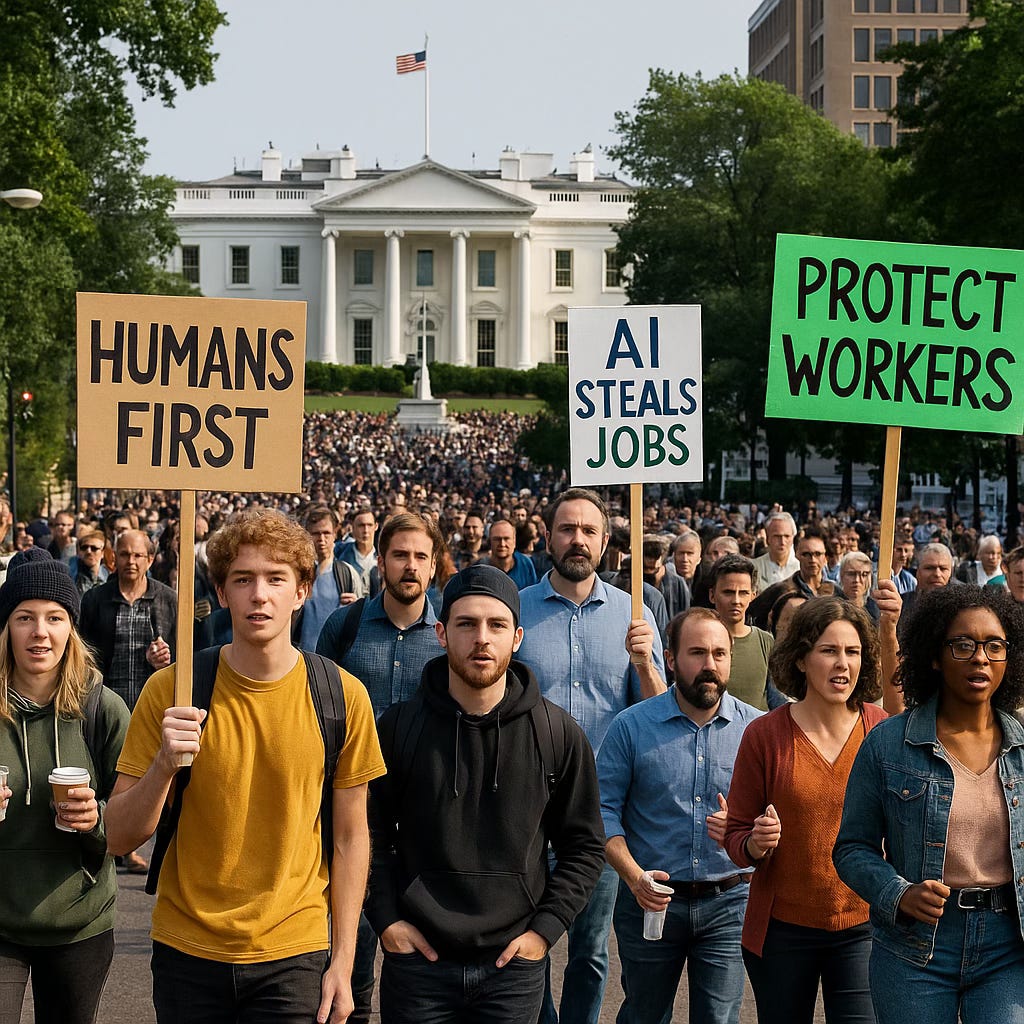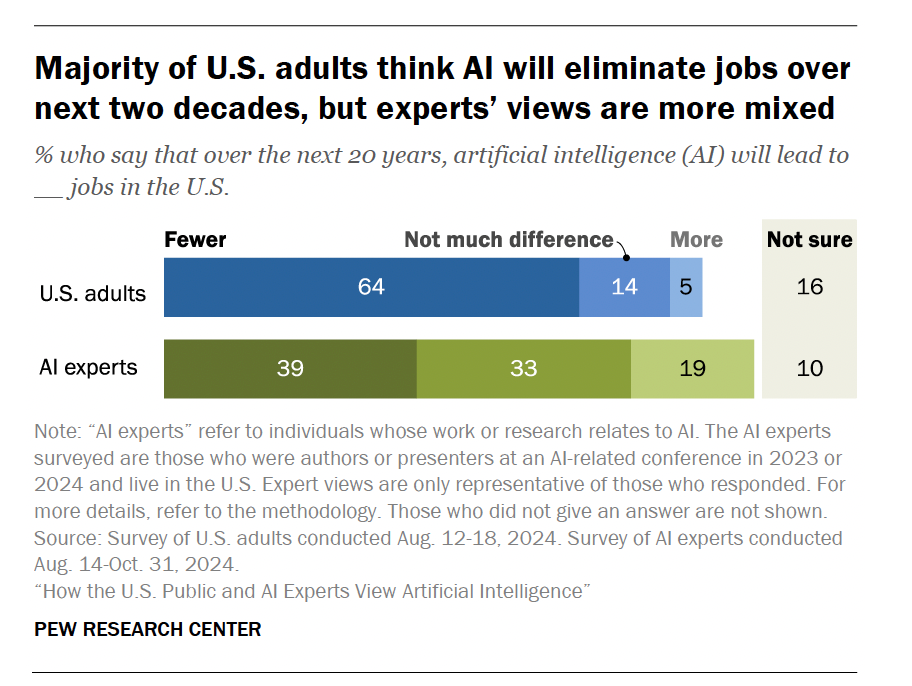Will the AI backlash spill into the streets?
The answer hinges on how severe and prolonged the economic disruption becomes—particularly for jobs.
AI backlash is rising—I see it every day in DuckDuckGo user feedback. That’s why our AI features (Search Assist and Duck.ai) are private, useful, and optional.
Concern alone won’t flood the streets—but if AI wipes out paychecks fast, and Washington stalls, more sustained protests and strikes could follow.
An April 2025 Pew Research report found widespread AI concern across various topics—jobs, privacy, inaccurate information, loss of human connection, the environment, and bias—but I think jobs can potentially lead to a categorically different societal reaction.
Why job losses could spark next-level backlash
Cuts span industries, so outrage lands on both parties.
Every income bracket—from cashiers to coders—takes a hit.
Sudden, deep job cuts risk recession and years of high unemployment.
Privacy, inaccurate information, loss of human connection, and environmental harms are, of course, very real. Yet, each mirrors existing debates—data protection, misinformation, social-media outrage, and climate change—that have stirred headlines for years without sustained street action or sweeping federal reforms (our still-missing U.S. privacy law, for example). To be fair, climate activism has produced some huge U.S. marches—for example, 400,000 in NYC in 2014, 200,000 in D.C. in 2017, and 250,000 in NYC again in 2019—but these were single-day spikes rather than sustained efforts.
Bias is a little different. America did flood the streets after George Floyd in a more sustained manner, for many months, but major reforms stalled out once marches faded and partisan lines re-hardened. Job-loss protests have the potential to run even broader and longer because they could directly hit wallets across the partisan divide, for years on end.
The extent of the backlash depends on the size and duration of the economic disruption. As I showed in this Gallup-poll post, even most Republicans who believe tariffs will pay off say they’d tolerate at most one year of economic pain for those benefits. Patience for AI-driven job loss is likely just as thin, if not more so. If AI keeps unemployment high, backlash lasts until it recovers or Washington intervenes.
Two historical moments that resemble this pattern: When automated textile frames wiped out skilled jobs in the U.K. in the early 1800s, the Luddite riots turned violent enough (including killing a factory owner) that Parliament dispatched roughly 12,000 troops to restore order, which concluded with over a dozen executions. By contrast, in early-1960s America, still shaking off a recession and high unemployment, there was widespread fear that automation might be at least partially to blame and that it would cause high unemployment to persist. Ultimately, it spawned a presidential commission, but unemployment returned to normal relatively quickly, so the future everyone feared never materialized.
There remain many open questions, though, which I hope to explore more in future posts. For example…
What is the net job impact?
Some jobs will clearly be displaced, which is already happening. But new ones will also be created. Will this be a large net negative, or will it be close to net neutral, similar to previous technology cycles? The public and “experts” are currently split on this question.
In our current survey, 64% of the public thinks AI will lead to fewer jobs over the next 20 years. Far fewer experts surveyed say the same (39%).
How do we help the displaced?
Even if job displacement is closer to net neutral, the displaced people aren’t likely to be the same people who get the new jobs. What, concretely, are we going to do for them? Historically, we haven’t done much, for example, for people who lost U.S. manufacturing jobs. We can do better this time. Interestingly, the recommendations from the 1960s-era presidential commission included income guarantees, relocation assistance, federal unemployment benefits, education subsidies, and government jobs.
Who pays for new government programs to help the displaced?
If intervention happens, who foots the bill—general taxpayers or the AI “winners” best positioned to do so?
If AI diffuses slowly, does aid get perpetually kicked down the road?
We’ve already seen several strikes in Hollywood, an auto-worker strike (concerning, in part, increased automation), and a dockworkers strike (with similar concerns). But these were scattered enough in time that they haven’t yet coalesced into a larger movement, similar to other scattered past protests. If future effects take many years to unfold across industries, then a critical mass may never form to create a true reform moment.
What will be the nature of the economic disruption?
If millions of jobs are displaced, there will be some economic disruption, but it could look very different from the past depending on if AI produces significant growth and productivity benefits, and in what timeframe. For example, it seems possible (though I have no idea right now with what liklihood) that unemployment spikes, but its GDP effects are offset by AI growth tailwinds that prevent a recession.
Do protests even matter?
I need to dig in more, but the short answer seems to indicate yes, in a few ways. They seem make the people who attend them more politically motivated, at least for that issue. As a result, if enough people go to them, then they can swing elections.
On average, a wave of liberal protesting in a congressional district can increase a Democratic candidate’s vote share by 2% and reduce a GOP candidate’s share by 6%. A wave of conservative protests, like those by the Tea Party in 2010, will on average reduce the Democratic vote share by 2% and increase the Republican share by 6%.
But, can they actually change policy directly? Here, it seems pretty mixed, like in the examples mentioned above. The potential seems there, though, if they are large and sustained enough.
What’s the best historical parallel(s)?
Recent protest movements seem more one-sided politically (e.g., climate change, Occupy Wall Street, Tea Party, etc.). Mid-century protests were arguably similar (civil rights movement, Vietnam War protests, etc.), though they were sustained for much longer and ultimately swayed public opinion and accelerated change. A better parallel here, though, would be something that is clearly bipartisan from the start, more squarely on an economic issue, and resulted in swift reforms. Protests after the 1911 Triangle Factory Fire that sparked rapid labor reforms are a candidate.
If others come to mind, or if you have thoughts on these other questions, please let me know.





Hey Gabe! Emanuele here 👋. Do you have any sense for what AI regulation could (or should) look like? For example, I’ve asked Duck.ai this very question and it didn’t mention anything about unemployment, which as you mentioned is likely to be the hottest topic, and it also seems the hardest to regulate (balancing the Great Race 🚣 vs job security 👨💼).
It is not lost on us that the image strongly appears to be AI generated.